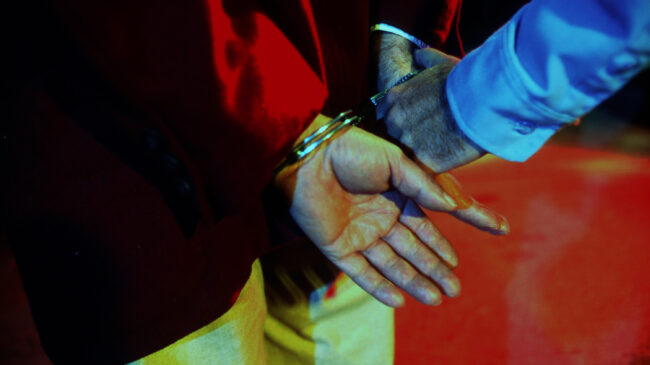In November 2014, police pulled over a disabled veteran in South Carolina for a minor traffic violation. After searching the veteran’s car, the police discovered small amounts of cannabis. Officers gave the veteran an ultimatum: help them or face stiff charges. Out of fear of criminal punishment, the veteran agreed to a controlled purchase of cannabis— roughly 100 dollars’ worth—from her friend, Julian, in Myrtle Beach. As a result, the police had enough information to establish probable cause to obtain a search warrant for Julian’s home.
A few months later, 12 officers from a multi-jurisdictional Drug Enforcement Unit (DEU) prepared to enter Julian’s home as part of “Operation Jules”—the nickname DEU used for the raid on Julian’s apartment. The officers, dressed in face coverings and camouflage, forced open the apartment door with a battering ram and eventually fired 29 bullets at Julian, leaving him paralyzed from the waist down.
As the result of the shooting and subsequent eight-figure settlement against the DEU and the City of Myrtle Beach, several changes to policing practices in the area were made. Specifically, the DEU stopped executing search warrants and using routine traffic stops to turn citizens into drug informants. While such policy changes should be lauded, reducing such overly intrusive policing tactics should not have to come at such costs.
The Myrtle Beach case encapsulates many of the problems with policing practices today: pretextual stops, militarization, and the overpolicing of low-level offenses.4 Although various policing reforms considered by lawmakers to address some of these problems may yield favorable results, such reforms fail to consider an essential aspect of modern-day policing—its inseparable link to the drug war. Because policing tactics are designed to maximize drug arrests and seizures, law enforcement initiates frequent and unwarranted contact with pedestrians and motorists. Such contact results in the overpolicing of minority communities, increased prison populations and jeopardized public safety.
Despite the interwoven nature of drugs and policing, drug decriminalization is not often considered a reform of policing practices. However, one could argue that decriminalization should be understood as a vital tool in limiting intrusive policing practices. Drug decriminalization is typically defined as a law that removes criminal sanctions for acquiring, possessing, or transporting small quantities of drugs for personal use and replaces them with civil sanctions.
This paper adopts that definition with two additions. First, the definition includes only decriminalization laws that have been considered by courts to limit police investigative authority—i.e., laws that affect police ability to establish reasonable suspicion or probable cause. Thus, state decriminalization laws that permit custodial arrests for civil drug offenses are not included.
Second, the definition also includes cannabis legalization. The definition does not include removing criminal sanctions for the production, distribution, or sale of drugs.
This paper proceeds in three parts.
Part 2 discusses the substantive reform arguments and approach to the decriminalization debate.
Part 3 explores how drug decriminalization affects policing practices. Specifically, it describes how drug decriminalization affects police authority to expand stops, conduct searches, and make arrests for drug possession. To illustrate these effects, three case studies are examined: New York, Oregon, and Colorado.
Part 3 also examines how drug decriminalization affects departmental incentives to conduct pretextual stops and militarize police personnel and divisions.
Lastly, Part 4 acknowledges and addresses how implementation issues with decriminalization affect policing practices.
Proponents of drug decriminalization typically emphasize the reform’s utilitarian potential to reverse mass incarceration trends, reduce racial disparities within the justice system, and minimize the economic costs associated with drug enforcement. However, such arguments are incomplete because they miss an important benefit—decriminalization’s effect on policing.
Recent decriminalization legislation in New York, Oregon, and Colorado affects police authority to expand stops, conduct searches, and make arrests for drug possession. Such legislation also affects departmental incentives to conduct pretextual stops and militarize police personnel and divisions. With the diminished capacity and incentive to pursue drug possession arrests, police can redirect resources toward crimes with victims, crime prevention, and public safety.
More time and data are needed to assess decriminalization’s impact on policing thoroughly. Nonetheless, cannabis legalization in many states, as well as comprehensive decriminalization in Oregon, provides a natural case study for further examination of this approach.
